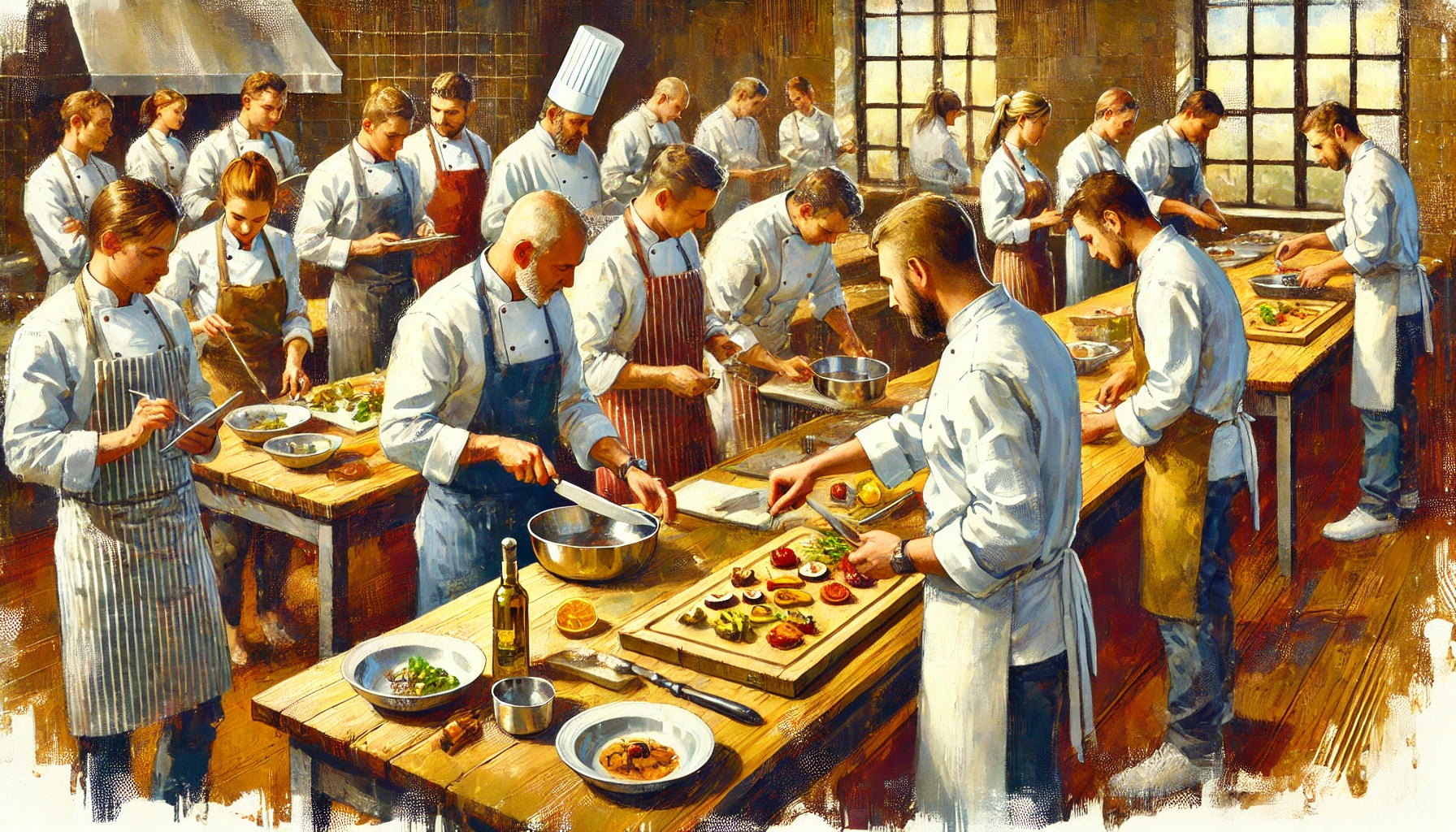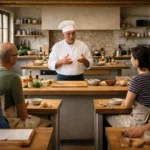The dream of creating mouth-watering dishes and presenting them with finesse isn’t reserved for elite chefs on television. It’s a reality that many aspiring chefs and food enthusiasts hope to achieve through culinary classes. Yet, a common roadblock stands in their way: where to start? With the abundance of online tutorials, books, and self-teaching methods, many find themselves overwhelmed or unsure of how to hone their skills and stand out in a competitive culinary world.
This post will explore how culinary classes offer an unparalleled pathway for developing the skills and confidence needed to thrive. From mastering essential techniques to understanding the nuances of global cuisines, these classes provide more than just knowledge—they offer a transformative experience. Whether you’re seeking to turn a passion into a profession or simply elevate your home cooking game, culinary classes can bridge the gap between where you are and where you aspire to be.
Let’s dive into the numerous benefits and uncover why these classes are a game-changer for aspiring chefs.
Understanding Culinary Classes and Their Impact
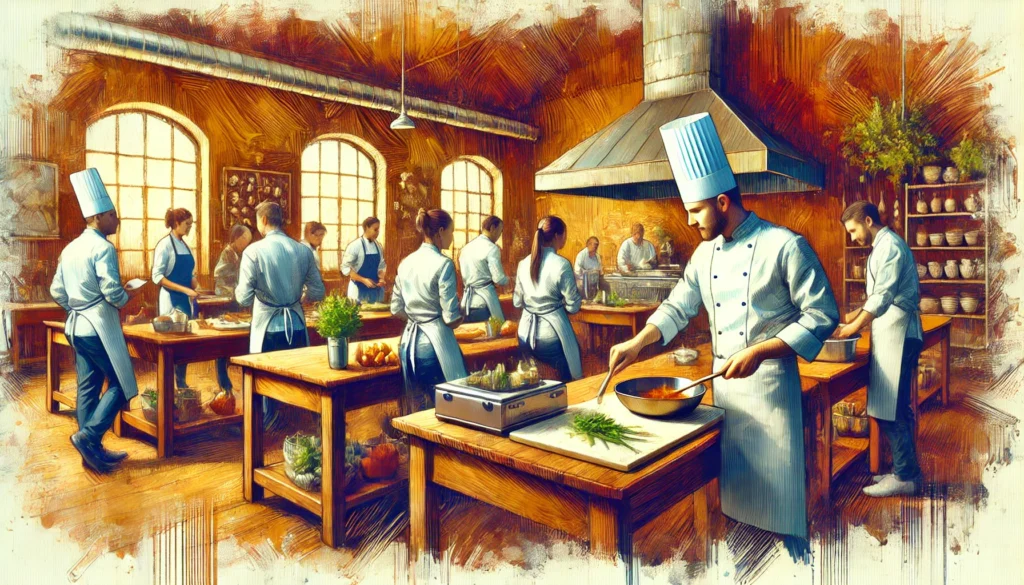
For anyone passionate about cooking, culinary classes provide a structured way to turn that passion into skill. These programs often follow a carefully designed curriculum, combining theory and practice to build a comprehensive understanding of cooking techniques. Step-by-step skill-building is a hallmark of these classes, allowing participants to progress from mastering basics like knife skills to tackling advanced concepts such as molecular gastronomy.
Whether you’re starting as a novice or already have some experience, these programs are designed to meet learners at various levels. The impact of these classes goes beyond just learning recipes; they aim to build a strong foundation in the art and science of cooking. Culinary classes are structured programs designed to teach participants the art and science of cooking. They range from:
- Basic workshops for beginners.
- Advanced training for those pursuing professional culinary careers.
A typical class might cover:
- Knife handling.
- Sauce preparation.
- Baking, as well as specialised skills such as molecular gastronomy or international cuisines.
For example:
- A beginner might learn how to make the perfect soufflé.
- An advanced chef could explore sous vide cooking.
These programs don’t just focus on the mechanics of cooking. They aim to cultivate a holistic understanding of culinary arts, teaching everything from ingredient sourcing to plating techniques.
Practical Guidance:
Choose classes tailored to your goals:
- Home cooks looking to improve daily meals should focus on basic cooking or family meal prep courses.
- Aspiring professionals should consider programs offering certifications like a Diploma in Culinary Arts.
Examples include:
- Workshops at local community colleges.
- Private cooking schools.
- Online platforms like MasterClass.
Key takeaway: Culinary classes don’t just teach recipes; they focus on building foundational skills, encouraging creativity, and fostering a deeper appreciation for food.
Top Benefits of Culinary Classes for Aspiring Chefs
Culinary classes are more than just lessons—they are transformative experiences that equip participants with practical skills, boost their confidence, and inspire creativity. For instance, many students in these programs recount learning how to prepare intricate dishes, like handmade ravioli or souffle, under expert guidance, transforming what once seemed daunting into a personal achievement.
These classes also provide an opportunity to connect with like-minded individuals who share a passion for the culinary arts, fostering a sense of community and collaboration that enhances the learning experience.
By immersing yourself in these programs, you unlock a world of opportunities, both personal and professional. Culinary classes offer a wealth of benefits beyond learning to cook. Here are some highlights:
1. Skill Development
- Gain hands-on experience with techniques like filleting fish, tempering chocolate, or creating emulsions.
- Research from BMC Nutrition shows that structured programs significantly improve culinary skills and health behaviours.
2. Exposure to Global Cuisines
- Learn to craft authentic Thai curries or balance flavours in a French patisserie.
- Schools like ICE offer international culinary tracks that inspire creativity and cultural appreciation.
3. Food Safety and Hygiene
- Emphasis on proper storage, cleanliness, and preventing cross-contamination.
- Efficient time management is a key focus for home cooks and professionals alike.
4. Fostering Creativity
- Experiment with fusion cuisine or artistic plating.
- Culinary classes encourage chefs to think outside the box, helping them develop their unique culinary styles.
Quick Tips:
- Learn time-saving techniques like prep organisation.
- Master basic flavour balancing to elevate any dish instantly.
Career Benefits for Aspiring Chefs
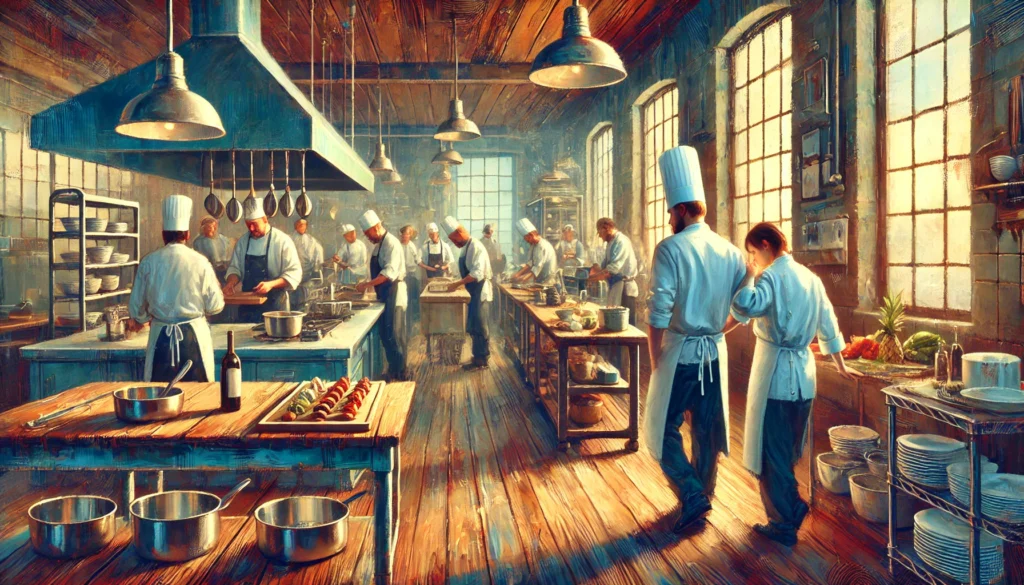
Embarking on a culinary career can be daunting, but culinary classes provide the tools, connections, and confidence needed to thrive in the competitive food industry. Tools such as state-of-the-art kitchen equipment training and recipe development guidance are invaluable for aspiring chefs. Additionally, connections built through mentorship programs and alumni networks help students secure internships and job placements in prestigious kitchens. From gaining certifications to building a professional network, these classes are a stepping stone toward achieving your culinary dreams.
1. Networking Opportunities
- Culinary schools connect students with industry professionals.
- Examples: Graduates landing roles at Michelin-starred restaurants or top catering companies.
2. Recognised Certifications
- Programs like Le Cordon Bleu and City & Guilds diplomas enhance employability.
- Certifications signal expertise and open doors globally.
3. Specialisation Opportunities
- Patisserie courses.
- Fine dining or haute cuisine focus areas.
- Modern specialisations like plant-based or sustainable cooking.
4. Developing Professional Discipline
- Learn mise en place and work under pressure.
- Build organisational skills critical for running a successful kitchen.
Pro Tip:
Specialise early to develop unique skills that set you apart in niche markets, like artisan bread-making or vegan cuisine.
Beyond the Kitchen – Broader Advantages
Culinary classes extend their impact far beyond the kitchen. They teach life skills that are invaluable in everyday life, build confidence, and create a sense of community among participants. This sense of community often develops through collaborative projects, such as group cooking challenges or themed meal preparations, where participants work together toward a common goal.
Additionally, many classes encourage group discussions and recipe-sharing sessions, fostering camaraderie and mutual learning among participants. These broader advantages make culinary classes a truly holistic learning experience. Culinary classes provide more than just kitchen skills. Key benefits include:
1. Building Confidence
- Constructive feedback helps participants feel empowered to experiment and grow.
- Overcome common kitchen fears, like handling knives or complex recipes.
2. Cultural Appreciation
- Learn traditions, ingredients, and techniques of various cuisines, like sushi-making to explore Japanese culture or pasta-making for Italian heritage.
3. Community and Collaboration
- Form friendships and professional relationships through teamwork.
- Collaborative projects, like group cooking challenges, enhance camaraderie.
4. Life Skills
- Develop time management, organisation, and problem-solving.
- Learn budgeting skills for sourcing high-quality ingredients without overspending.
Pro Tip: Apply these transferable skills to other areas of life for holistic growth.
Comparing Culinary Classes with Alternative Learning Methods
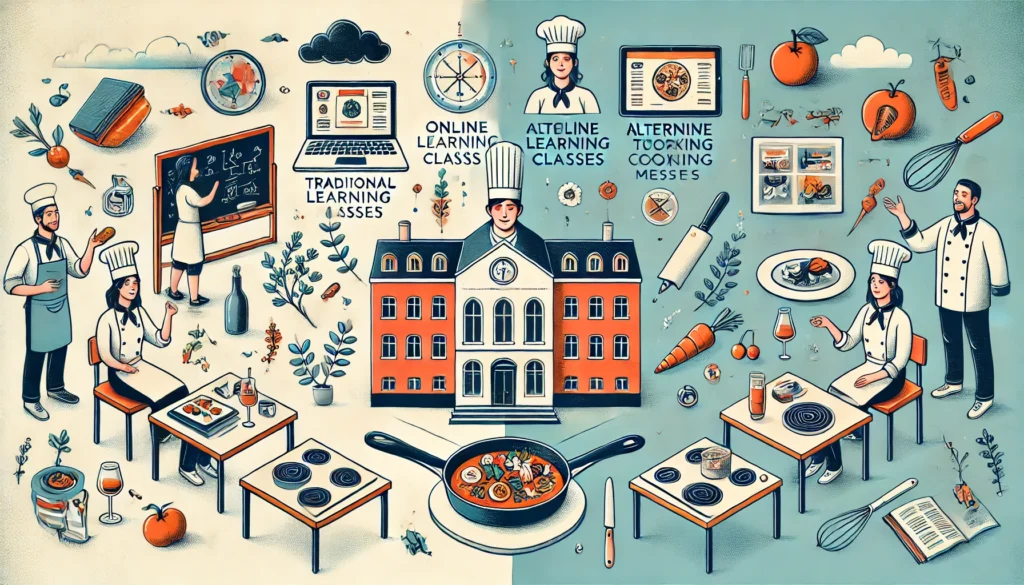
For aspiring chefs and food enthusiasts, the question often arises: should you invest in culinary classes or explore alternative learning methods? Comparing these options helps highlight why structured programs stand out for providing a balanced, hands-on, and comprehensive approach to mastering the culinary arts.
1. Online Platforms
- Flexible and affordable, e.g., MasterClass.
- Lack of hands-on practice and immediate feedback.
2. Apprenticeships
- Provide real-world experience in professional kitchens.
- May not cover foundational techniques comprehensively.
Why Culinary Schools Excel
- Blend hands-on practice with expert guidance.
- Comprehensive curriculum covering theory, practice, and real-world application.
Key Insight: Escoffier highlights this approach as the gold standard for culinary education.
How to Choose the Best Culinary Classes for Your Goals
With so many culinary programs available, choosing the right one can feel overwhelming. For instance, programs like Le Cordon Bleu are globally recognised and known for their rigorous training, while smaller local workshops might focus on niche skills such as artisanal bread-making.
A common pitfall is selecting a program without researching its curriculum or accreditation, which could lead to limited career opportunities. Taking time to evaluate your goals and the program’s offerings is essential to making the right choice. By focusing on accreditation, curriculum, financial considerations, and format, you can select a program that aligns with your aspirations and lifestyle. These tips will guide you in making an informed choice.
Choosing the right program also means considering factors such as class size and instructor expertise. Smaller classes often allow for more personalised attention, while experienced instructors can provide invaluable insights and mentorship. By prioritising these aspects, you can ensure a more enriching and tailored learning experience.
1. Accreditation Matters
- Reputable schools like Le Cordon Bleu ensure quality education.
2. Curriculum Alignment
- Review course outlines to match your goals, e.g., patisserie specialisations.
3. Financial Considerations
- Explore scholarships and grants via resources like All Culinary Schools.
4. Class Size and Format
- Smaller classes offer personalised attention.
- Online options provide flexibility for working professionals.
Pro Tip: Visit facilities or attend open houses for better insights.
Transform Your Passion Into Expertise
Culinary classes have the power to take your love for cooking to new heights. They offer a unique blend of practical skills, cultural enrichment, and professional opportunities that other learning methods can’t match. These programs don’t just teach you to cook—they help you develop confidence, creativity, and a professional edge.
Whether you’re a home cook eager to impress friends and family or an aspiring chef with dreams of running your kitchen, these classes provide the tools and knowledge to make those goals a reality. By immersing yourself in structured, hands-on training, you’ll be prepared to take on challenges and create dishes that inspire.
Take Action: Explore local or online culinary programs and discover how structured training can unlock your potential. Remember, every great chef started with a single lesson—let this be yours. Let your culinary journey begin today!
